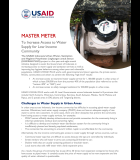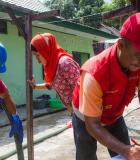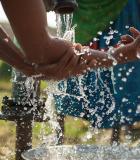Hati Kami Child Survival Project
Hati Kami, an urban health project located in the West Jakarta Municipality of Jakarta Province in Indonesia, was a four-year Innovation Child Survival and Health Grants Project (CSHGP). The project, whose name means “Our hearts”, was designed to address high rates maternal and neonatal mortality, increased rates of bottle/formula feeding, and limited growth in exclusive breastfeeding (EBF) rates; it successfully built on the results and lessons learned of Healthy Start, Mercy Corps’ previous CSHGP project in Jakarta Province. The overarching goal of the project, implemented from September 2010 through September 2014, was to “promote, support, and protect the mother-child dyad for a healthy start among Jakarta's poor residents” according to the project proposal.
Activity Description
Key interventions included: establishing Mothers Support Groups (MSGs) for reaching mothers with critical information on breastfeeding and maternal and newborn care; integrating counseling on maternal-infant health and nutrition into the 7+ contacts in maternal-newborn care1 ; scaling up WHO’s 40-hour Breastfeeding Counseling (BFC) training; implementing a targeted communication strategy; adapting the Standards Based Management and Recognition (SBMR) approach for private midwives; supporting the Municipality Health Office (MHO) and local branch of the Indonesian Midwives Association (Ikatan Bidan Indonesia, IBI) to train providers on the Kangaroo Mother Care method; and replicating the 10 steps to successful breastfeeding model of the previous Healthy Start project.
The Operations Research (OR) component was designed to address current shortcomings in the existing implementation of the MoH maternal and child health Local Area Monitoring and Tracking (LAMAT) system. The OR, hereinafter referred to as m-PWS (short for Mobile Area Monitoring and Tracking in Indonesia) was conducted in partnership with the University of Indonesia’s Center for Family Welfare Research (CFW-UI). With m-PWS, Hati Kami and CFWUI investigated the use of mobile phone technology to improve the quality of MCH-LAMAT data with a cost-effective, efficient and user-friendly mobile-based electronic health record system. The m-PWS tool was tested throughout the data process (from data collection to data analysis) to see if it can be used for inclusive and participatory data monitoring and tracking purposes.
Expected Outcomes
- Improved maternal child care and nutrition practices of mothers from pregnancy through the first 6 months of life
- Improved quality of maternal, newborn and infant services.
Actual Outcomes
- Successfully adapted a self-assessment tool (SBMR) to improve performance of private midwives delivering MCH services
- Set the stage for sustainability of a number of program effects and initiatives by reinforcing solid partnerships with government and private organizations
- Promoted strong community engagement through training, BCC activities and identifying “champions” to promote key messages
- Tested an approach for using mobile phones for routine data collection, creating high interest within the Ministry of Health for using mobile technology
- Scale up of several interventions already being undertaken by key partners, including the PHO





